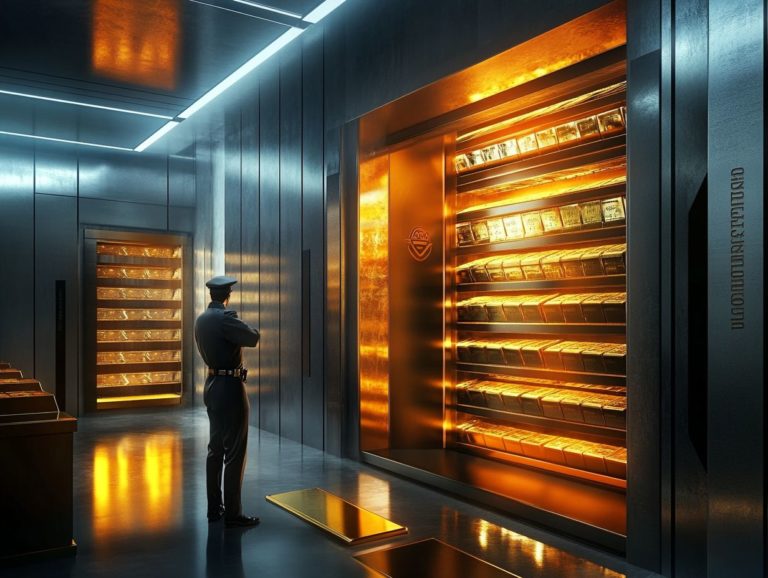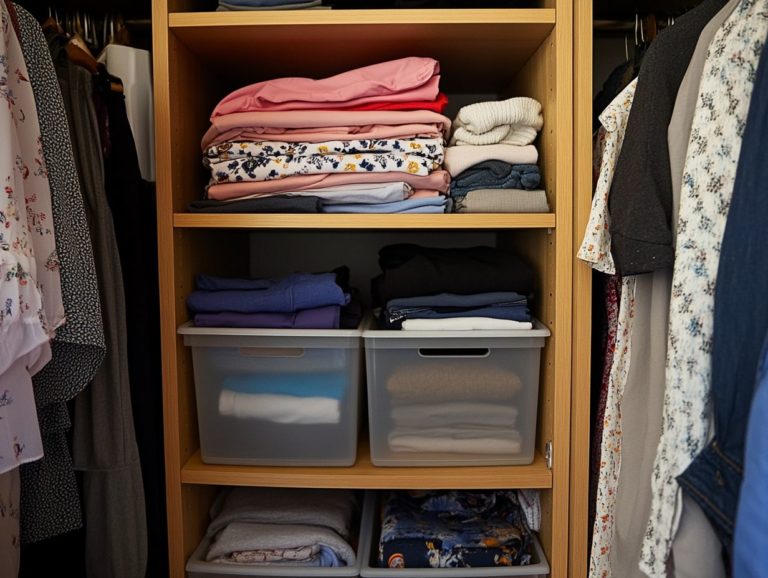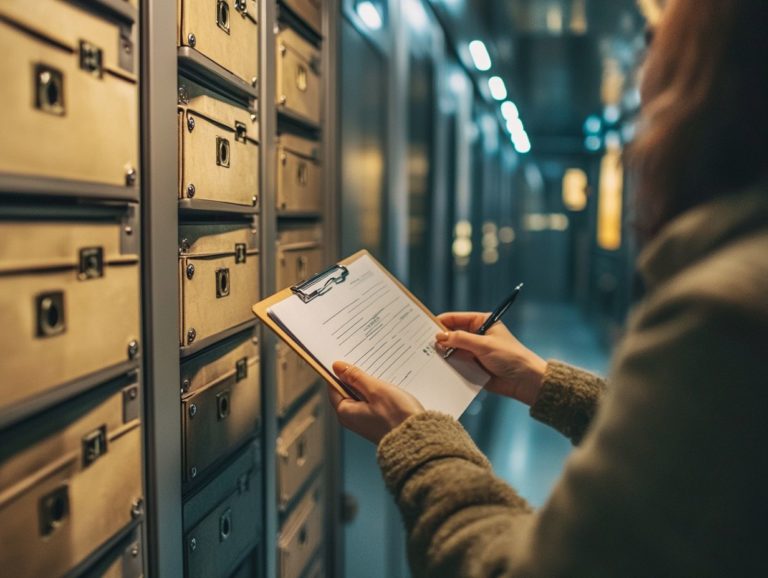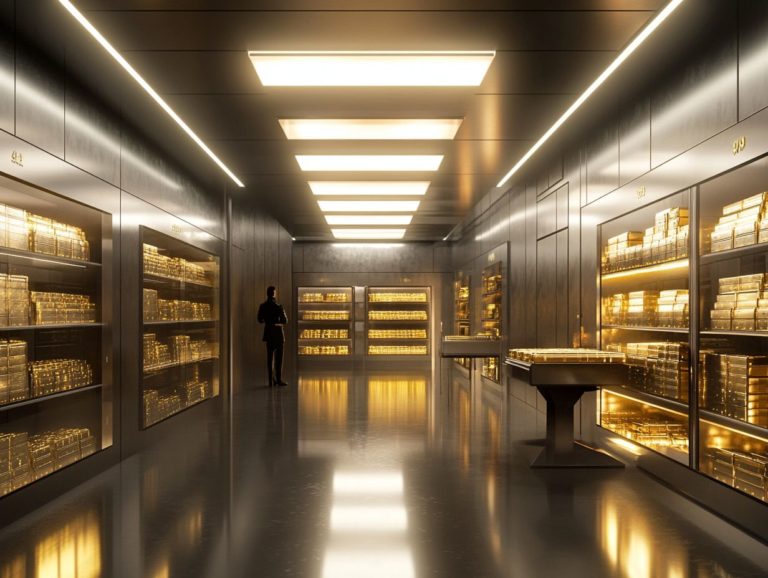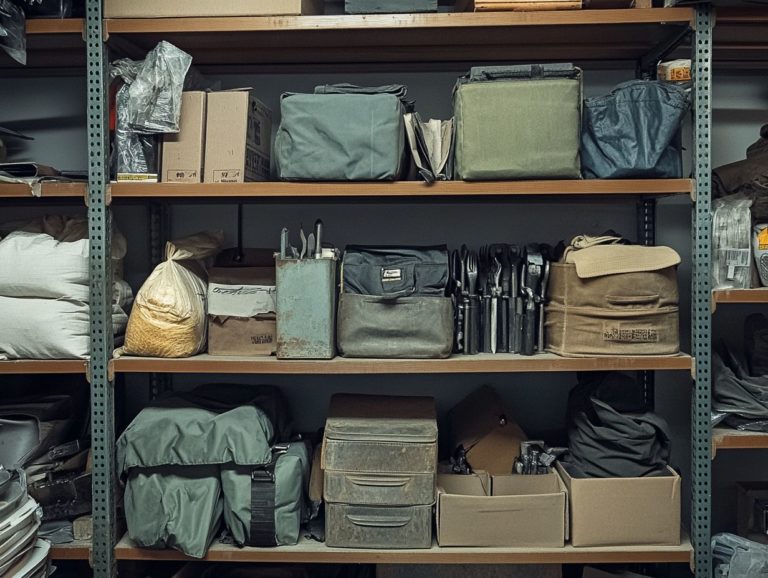5 Frequently Asked Questions About Storage
Finding the perfect storage solution doesn t have to be overwhelming, especially with the multitude of options available.
Whether you re downsizing, decluttering, or in need of extra space, understanding your storage needs is essential for a successful transition. This article addresses five frequently asked questions about storage, exploring various options, necessary space, and the advantages of professional services.
It also examines how to safeguard your items, assess accessibility, and prepare for storage, ensuring you make informed decisions at every step of the process.
Contents
- Key Takeaways:
- 1. What Are the Different Types of Storage Options Available?
- 2. How Much Storage Space Do I Need?
- 3. Is Climate-Controlled Storage Necessary?
- Conclusion
- 4. How Do I Protect My Items in Storage?
- 5. Can I Access My Items in Storage at Any Time?
- What Are the Advantages of Using a Professional Storage Service?
- Frequently Asked Questions
Key Takeaways:
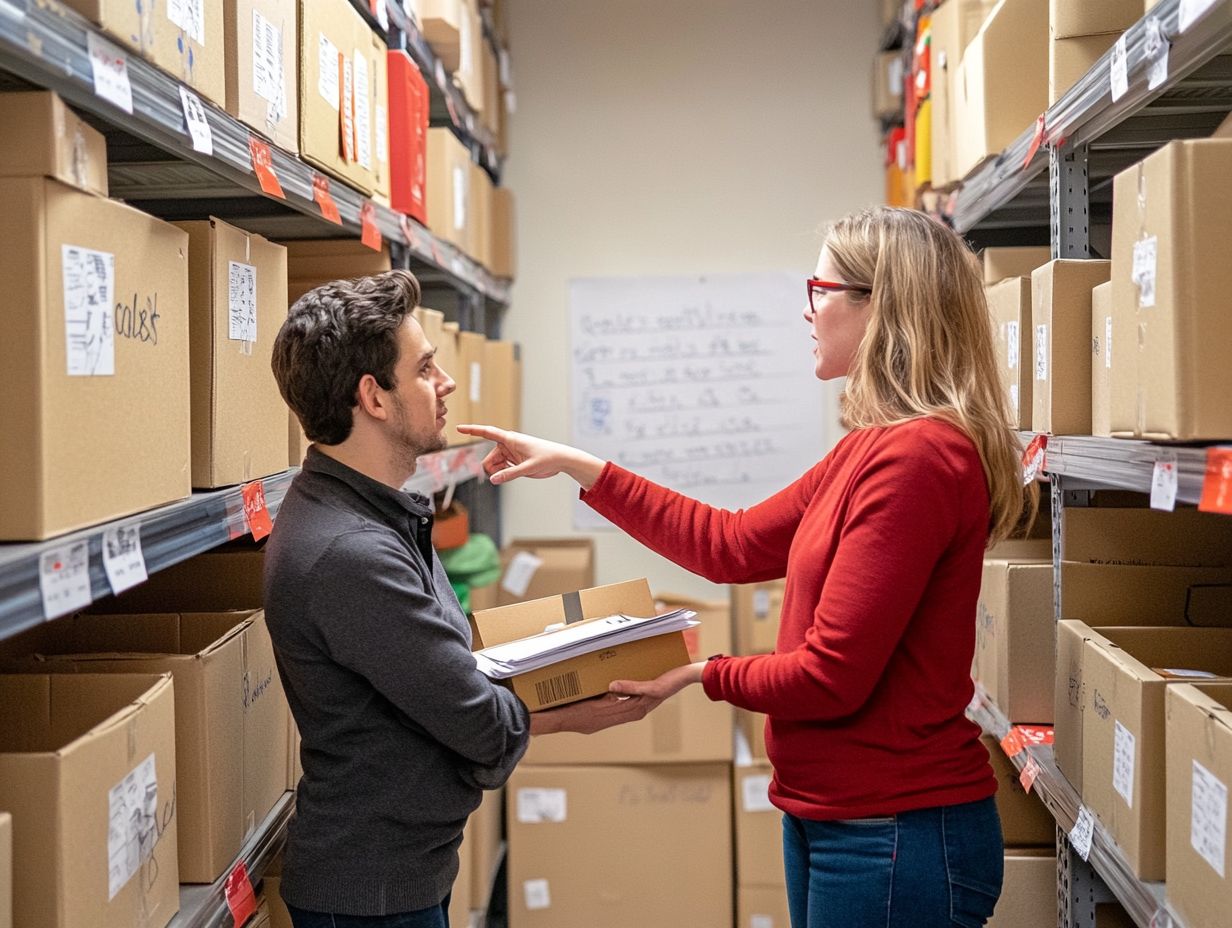
- Different storage options include self-storage, climate-controlled storage, and professional storage services.
- Determine your storage needs by considering the quantity and type of items you need to store.
- Climate-controlled storage protects sensitive items from damage due to extreme temperatures and humidity.
1. What Are the Different Types of Storage Options Available?
The self-storage industry presents a wide array of options tailored to meet your diverse needs. With solutions ranging from drive-up storage units, which allow you to park right next to your unit for easy loading and unloading, to indoor and climate-controlled units, you can rest assured that everything from furniture to vehicles can be stored safely, regardless of your location whether in Texas, California, New York, Hawaii, or Oklahoma.
Drive-up storage units offer easy access for loading and unloading larger items, making them perfect for homeowners or businesses in bustling cities like Houston, where convenience reigns supreme. In contrast, indoor storage units enhance security and protect your belongings from environmental elements, especially in regions with harsh winters, like New York.
If you need to store sensitive items, temperature-regulated units provide controlled conditions, safeguarding your valuable possessions such as antiques or electronics. Choose a reliable storage facility. It guarantees peace of mind and offers extra services to improve your experience.
2. How Much Storage Space Do I Need?
Determining the right amount of storage space is crucial, as it largely depends on the variety and volume of items you intend to store be it household furniture, electronics, or even vehicles like RVs and cars.
Consider your potential future needs. Will you likely accumulate more belongings, or might you need temporary storage during a move?
Storage unit sizes vary significantly, from compact 5×5 units that are perfect for small boxes or seasonal items to expansive 10×20 units that can accommodate the contents of an entire home.
By clearly understanding what specific items you plan to store, you can better visualize your options and select the appropriate size. This approach ensures everything fits comfortably, avoiding wasted space and unnecessary costs.
3. Is Climate-Controlled Storage Necessary?
Climate-controlled storage has become increasingly essential, particularly for items sensitive to fluctuations in temperature and humidity. Understanding the features of a storage facility helps you make informed decisions that align with today s storage demands.
In this context, temperature regulation plays a crucial role in preserving sensitive belongings such as electronics, artwork, and antique furniture. These items are at risk of irreversible damage when exposed to extreme conditions. For example, sudden temperature shifts might warp wood or cause electronic components to malfunction. Such situations often arise during seasonal transitions, where humidity levels can swing dramatically, making temperature regulation a critical element in protecting your valuables.
While choosing climate-controlled units may come with slightly elevated storage costs, the peace of mind and protection they provide against environmental threats often render them a wise investment.
Conclusion
In summary, understanding your storage needs and options is vital for making informed decisions. Evaluate your items, consider your future requirements, and choose a facility that offers the services you need. Don t hesitate; explore your storage options today or consult a professional service for assistance!
4. How Do I Protect My Items in Storage?

Protecting your items in storage involves understanding the essential features of a storage facility and taking advantage of tenant protection plans. These can help shield against potential risks like theft or damage.
Choosing a facility with strong security features is very important. Look for options like 24/7 surveillance, gated access, and individual unit alarms to ensure your belongings are secure. Many providers also offer insurance options to give you peace of mind. Be sure to review the coverage included and consider your specific needs to select the right policy.
By combining excellent facility features with proper insurance, you can significantly minimize the risks associated with storing your valuable items.
5. Can I Access My Items in Storage at Any Time?
Accessing your items stored in a facility is very important. Understanding the features outlined in your rental agreement will determine whether you can access your belongings at any time or face restrictions.
Typically, storage facilities provide various access hours. Some may offer 24/7 access, allowing you to retrieve or store items whenever you wish. Others might impose limited hours, restricting access to specific times of the day.
This is why it’s essential to read your rental agreement thoroughly. It contains the access policies that directly impact your convenience. Features like drive-up storage can greatly enhance your experience, simplifying loading and unloading for a more efficient storage journey.
What Are the Advantages of Using a Professional Storage Service?
Using a professional self-storage service offers many advantages. You get reliable storage solutions tailored to your needs, efficient facility management, and often competitive pricing that eases moving or downsizing.
These services offer flexibility, which is beneficial for personal and business storage. You can choose from various size options to meet your unique requirements. Enhanced security measures, like surveillance cameras and controlled access, provide peace of mind, knowing your items are well-protected. Additionally, it’s important to consider 5 factors to consider in metal storage to ensure optimal protection for your valuables.
With expert management, you can focus on what truly matters, confident that your belongings are stored safely and efficiently. Understanding the 5 key features of secure metal storage can enhance your decision-making process. With all these great features, choosing professional storage is a smart and exciting decision!
What Are the Common Items That Can Be Stored?
A variety of common items can be securely stored in self-storage facilities. This includes everyday household furniture, electronics, and vehicles like RVs. It’s especially useful during moving transitions or seasonal changes.
These facilities are a practical solution for anyone looking to declutter their home or safely stow away possessions that aren t needed immediately. Household items like old appliances, seasonal decorations, and extra furniture tend to accumulate quickly, making storage a sensible choice.
Vehicles, whether it’s a motorcycle or a classic car, often require dedicated space, especially in winter. Seasonal items like holiday decorations, summer gear, or gardening tools can also benefit from temporary storage, keeping your living space organized and functional year-round.
How Can I Determine the Best Storage Option for My Needs?
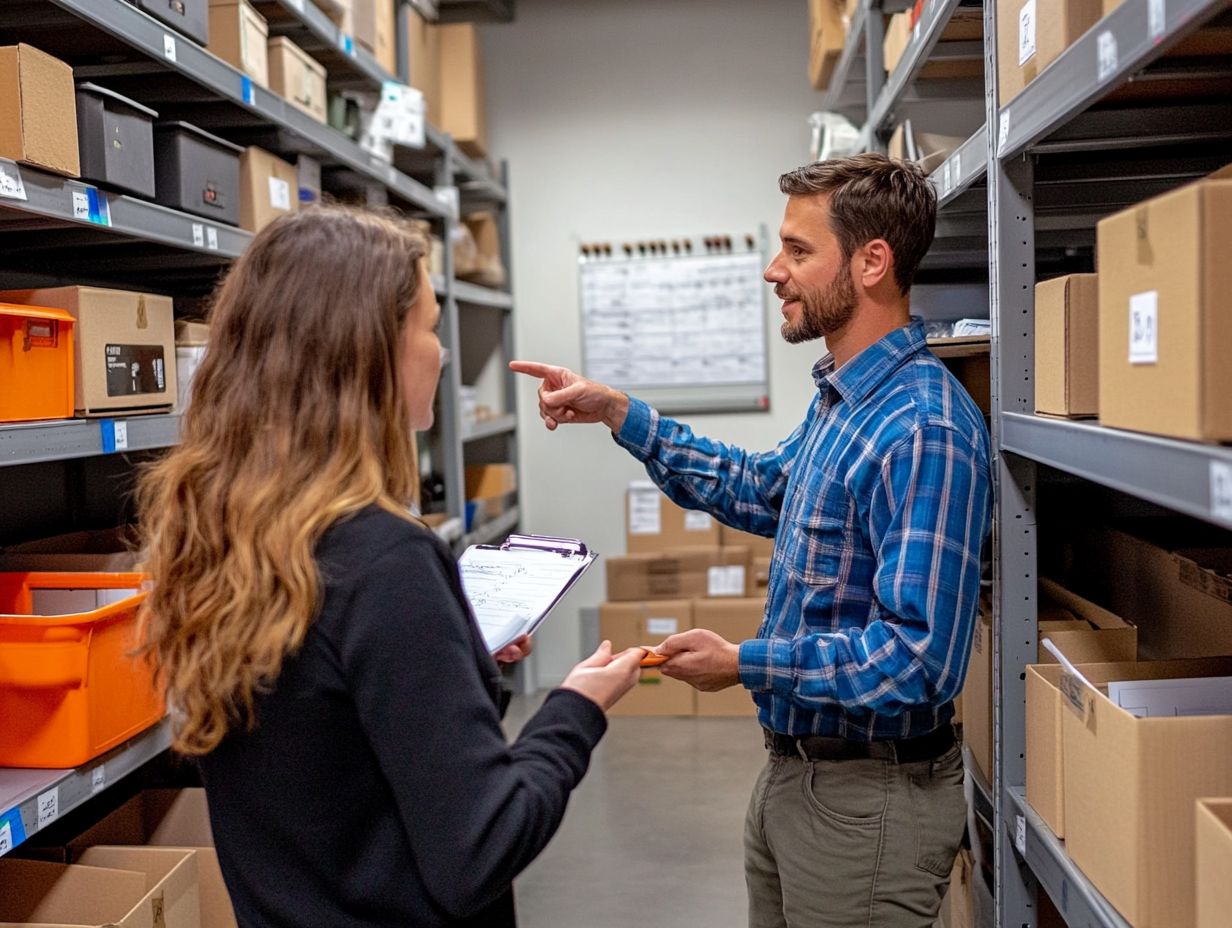
Determining the ideal storage solution requires thoughtful assessment of several factors, including the variety of storage options available, specific features that matter to you, and the current demand for storage in your area.
- Start by categorizing your storage requirements based on what you intend to store seasonal items, furniture, or important documents.
- Next, reflect on the accessibility of potential storage facilities. Are they conveniently situated and easy to reach?
- Explore features that could elevate your storage experience, such as temperature control to keep your items safe, security measures, and various size options.
- Evaluate the costs associated with each facility in relation to your budget and the value they provide.
- Investigating local demand for storage solutions will offer valuable insights into price trends and competition, ultimately steering you toward the most fitting choice for your needs.
What Are the Costs Associated with Using a Storage Service?
Understanding the costs of renting storage is essential, as various factors such as unit size, location, and the management of the storage facility can significantly influence your overall expenses.
For example, monthly fees can vary greatly depending on the size of the unit, with larger spaces typically commanding higher prices. Be aware of potential hidden costs, like administrative fees or insurance requirements, which could unexpectedly inflate your total bill. To maximize efficiency, consider following the 5 steps to organize your metal storage. Weigh these storage costs against the benefits of professional management, considering how these services can enhance security and improve accessibility.
Regional variations matter as well; states like Texas might offer lower average rates compared to California, where demand often drives prices higher. Understanding these nuances helps you make well-informed decisions regarding your storage needs.
What Are the Risks of Using Self-Storage?
Don t overlook the important risks involved being aware can save you from future headaches! While self-storage can be practical, it s crucial to recognize the potential risks, such as concerns related to facility features, security, and the lack of comprehensive tenant protection plans.
To safeguard your belongings, be mindful of common issues like theft, water damage, and fire hazards that might arise in these facilities. Opting for a self-storage unit equipped with robust security features, like surveillance cameras and access control systems, can significantly mitigate the risk of theft. Additionally, choosing accessories like those outlined in the 5 must-have accessories for metal storage can enhance your storage solutions. A climate-controlled unit can also help prevent damage from moisture, while keeping your items away from potential fire sources is equally vital.
Investing in insurance provides an extra layer of protection, enabling you to recover losses if an unfortunate incident occurs. By planning ahead and selecting the right facility, you can enjoy greater peace of mind.
How Can I Prepare My Items for Storage?
Preparing your items for storage is key to ensuring their safety and longevity. This involves thoughtful packing and consideration of what you’re storing, whether household goods, vehicles, or seasonal items.
To make your transition seamless, start by choosing the right packing materials. Use sturdy boxes, bubble wrap for fragile items, and breathable covers for your vehicles. Also, consider the environmental conditions of your storage space, as humidity and temperature can significantly impact sensitive items like electronics or antiques.
Don t underestimate the power of clear labels and a well-maintained inventory. Keeping track of your stored items helps you find what you need and ensures that nothing slips through the cracks over time. This organized approach will save you headaches down the line.
Watch this video for expert tips on storage preparation!
Frequently Asked Questions
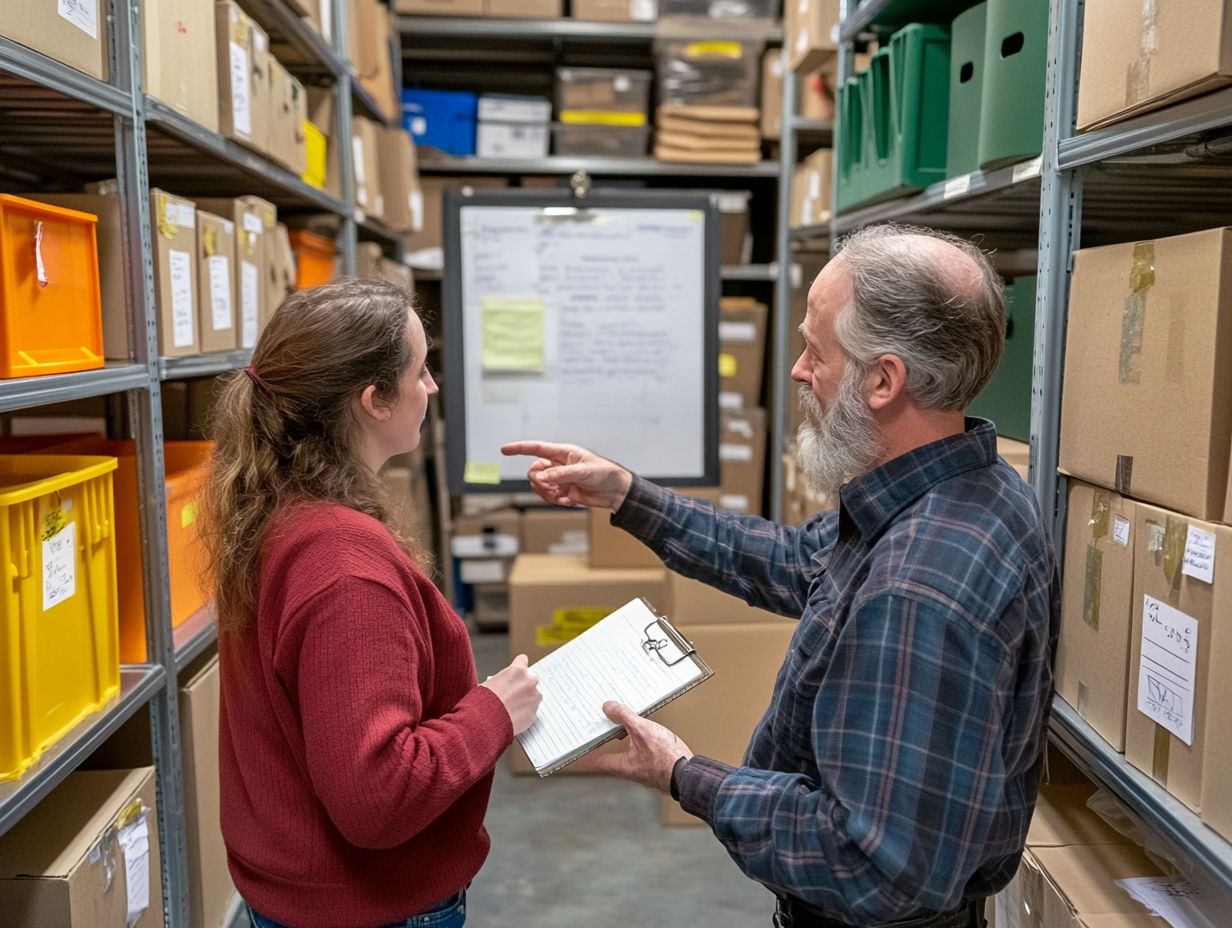
What are the different types of storage devices?
There are several types of storage devices, including hard drives, solid-state drives, USB flash drives, optical drives, and cloud storage.
Each type has unique features and advantages.
How much storage do I need for my device?
The amount of storage you need depends on your specific usage and needs.
If you use your device for basic tasks like web browsing and document editing, a few hundred gigabytes should suffice.
However, if you store large files or use your device for gaming or video editing, you may need several terabytes of storage.
Can I expand the storage on my device?
It depends on the type of device you have.
Some devices have expandable storage options, such as an SD card slot, while others do not.
Be sure to check your device’s specs to see if you can expand its storage!
What is the difference between internal and external storage?
Internal storage refers to the built-in memory of your device.
External storage refers to storage devices that can be connected to your device, like USB drives or external hard drives.
Internal storage is faster. External storage gives you flexibility and makes transferring files easy.
Is it safe to store sensitive information on cloud storage?
Cloud storage providers have security measures to protect your data, but you should always encrypt any sensitive information before storing it on the cloud.
Protect your data now by encrypting that sensitive information!
Choose a reputable and secure cloud storage provider.










